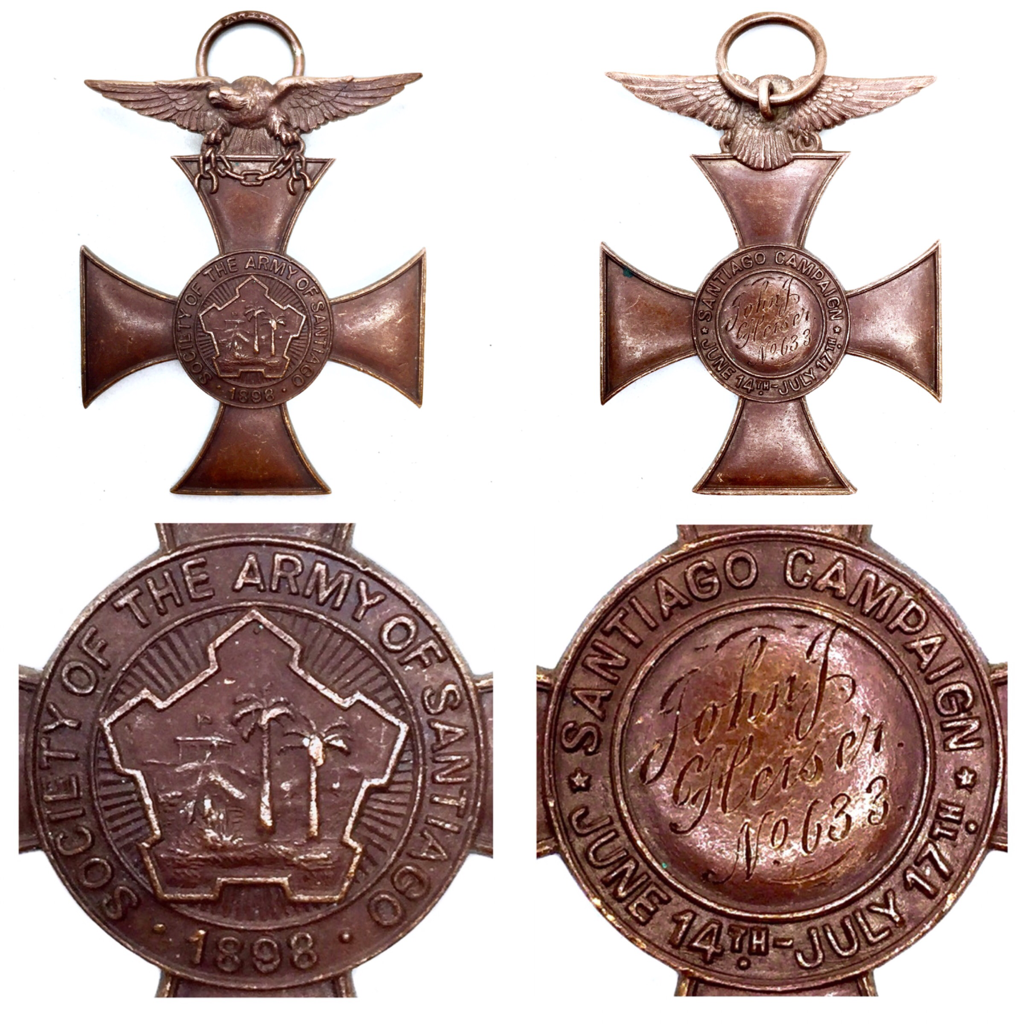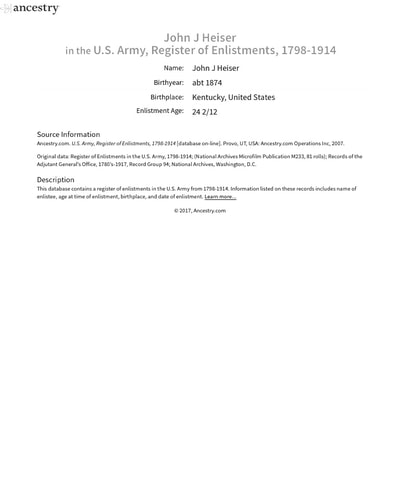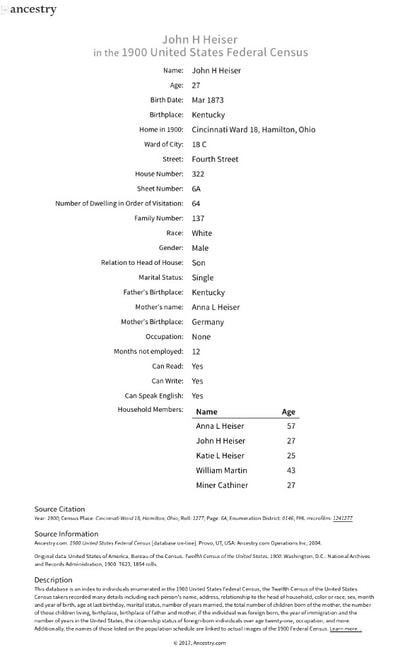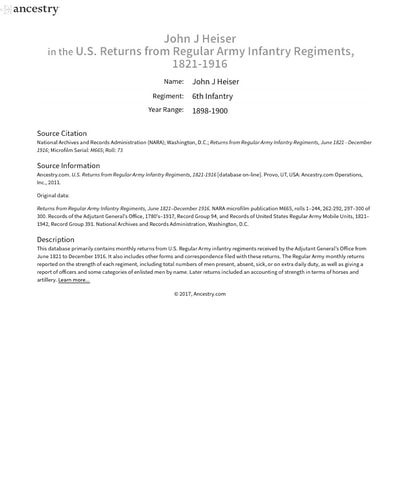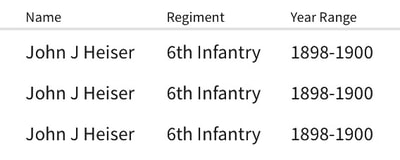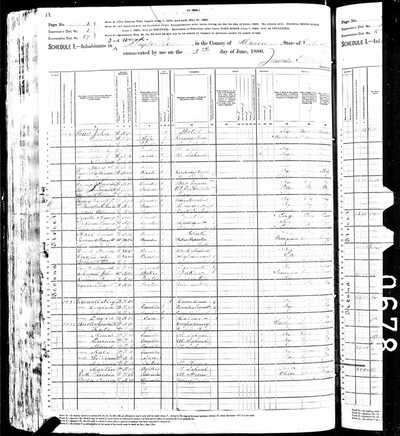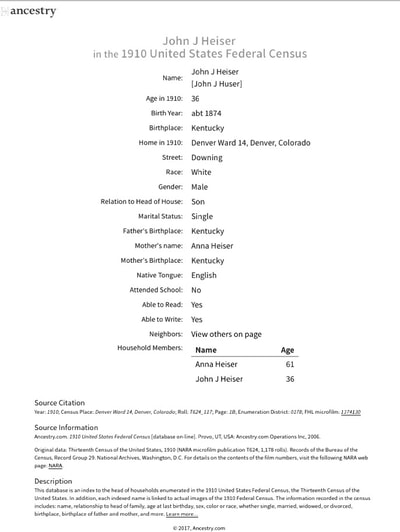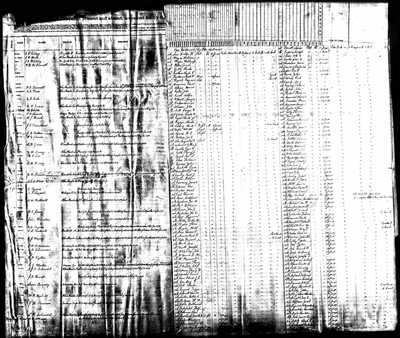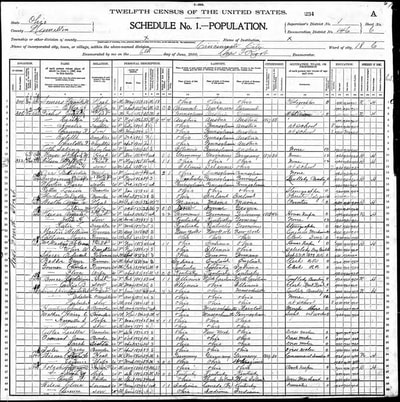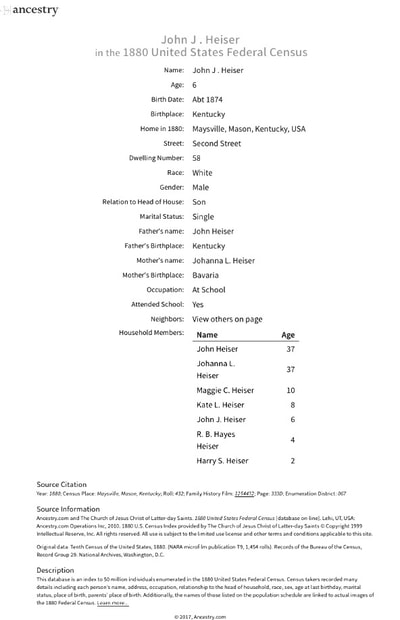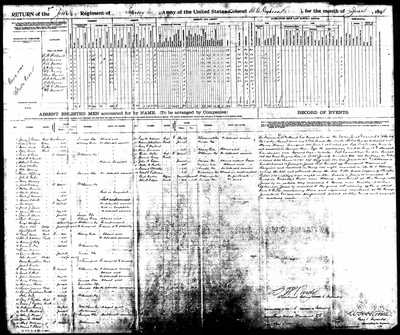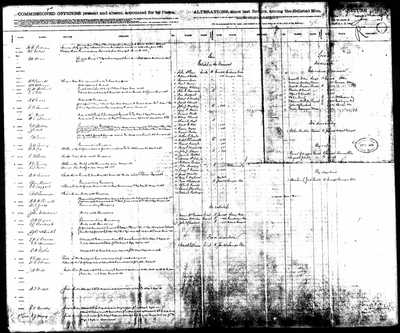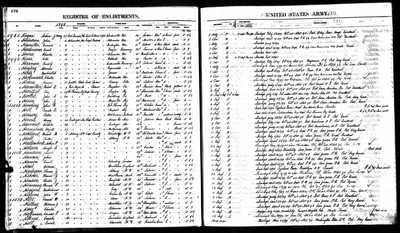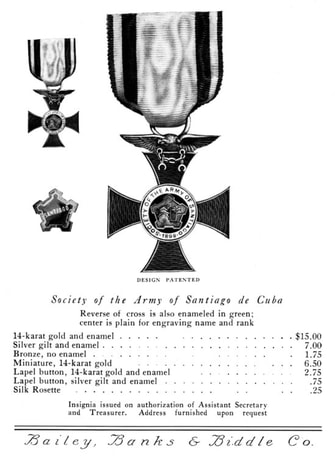society of the army of santiago de cuba medal
No. 633
"John J. Heiser"
Private John J. Heiser
John J. Heiser was born in 1874 in Marsville, Kentucky the son of John Heiser and Johanna L. Bauder.
According to the 1880 US Census Heiser was living with his family in Maysville, Kentucky where he father was employed by a hotel.
Heiser worked as a blacksmith prior to enlisting in the Army.
Hesier enlisted in the Regular Army on May 17, 1898 at Fort Thomas, Kentucky. Heiser was assigned to Company F, 6th US Infantry. The 6th US Infantry was Brigaded with the 16th US Infantry and those two regiments combined lost over 200 men killed or wounded in the charge up the hills before Santiago, Cuba on July 1, 1898. The reporters were from New York and accompanied Teddy Roosevelt a New York Blue Blood up the same hill, so not to discount the Rough Rider's roll in the battle but the Regular Army bore the brunt during the battle, in particular the 6th and 16th US Infantry suffered horrendous casualties as neither regiment had more than 600 men assigned. It rather tough to find Federal Campaign Medals to these regiments, as few of the men reenlisted after that bloody day, and then the two weeks in the trenches before Santiago. The Army was so weakened that Major General Shafter did not dare assaulting it, so Sampson's fleet had to destroy the Spanish Fleet in the Harbor which forced the Spanish garrison to capitulate.
Heiser took his early discharge on January 20, 1899 at Fort Sam Houston, Texas as a Private.
Heiser applied for a federal invalid pension in March of 1899 which was granted. At the time of his application he was living in Ohio.
According to the 1900 US Census Heiser was living with his widowed mother and sister in Cincinnati, Ohio. Hesier is listed as not working at the time of the census.
According to the 1910 US Census Heiser was living with his widowed mother this time in Denver, Colorado. Neither of them were employed at that time. I assume that Heiser moved west in an attempt to improve his health, which appears to have been devastated by whatever he picked up in Cuba during the Spanish American War.
Nothing on John J, Heiser has been found after the 1910 US Census, so it would appear that he died sometime after 1910 but no records have been located recording his death.
According to the 1880 US Census Heiser was living with his family in Maysville, Kentucky where he father was employed by a hotel.
Heiser worked as a blacksmith prior to enlisting in the Army.
Hesier enlisted in the Regular Army on May 17, 1898 at Fort Thomas, Kentucky. Heiser was assigned to Company F, 6th US Infantry. The 6th US Infantry was Brigaded with the 16th US Infantry and those two regiments combined lost over 200 men killed or wounded in the charge up the hills before Santiago, Cuba on July 1, 1898. The reporters were from New York and accompanied Teddy Roosevelt a New York Blue Blood up the same hill, so not to discount the Rough Rider's roll in the battle but the Regular Army bore the brunt during the battle, in particular the 6th and 16th US Infantry suffered horrendous casualties as neither regiment had more than 600 men assigned. It rather tough to find Federal Campaign Medals to these regiments, as few of the men reenlisted after that bloody day, and then the two weeks in the trenches before Santiago. The Army was so weakened that Major General Shafter did not dare assaulting it, so Sampson's fleet had to destroy the Spanish Fleet in the Harbor which forced the Spanish garrison to capitulate.
Heiser took his early discharge on January 20, 1899 at Fort Sam Houston, Texas as a Private.
Heiser applied for a federal invalid pension in March of 1899 which was granted. At the time of his application he was living in Ohio.
According to the 1900 US Census Heiser was living with his widowed mother and sister in Cincinnati, Ohio. Hesier is listed as not working at the time of the census.
According to the 1910 US Census Heiser was living with his widowed mother this time in Denver, Colorado. Neither of them were employed at that time. I assume that Heiser moved west in an attempt to improve his health, which appears to have been devastated by whatever he picked up in Cuba during the Spanish American War.
Nothing on John J, Heiser has been found after the 1910 US Census, so it would appear that he died sometime after 1910 but no records have been located recording his death.
Society of the Army of Santiago de Cuba was an organization, the purpose of which was to record the history and conserve the memory of the events of the campaign which resulted in the surrender, on July 17, 1898, of the Spanish army, the city of Santiago de Cuba, and the military province to which it pertained during the Spanish–American War.
The membership of the Society shall consist of all officers and soldiers of the United States Army (including Acting Assistant Surgeons and authorized Volunteer Aides), who constituted the expeditionary force to Santiago de Cuba and who worthily participated in the campaign between the dates of June 14 and July 17, 1898, and who shall signify their wish for membership by making application and paying the dues.
There shall be three classes of membership, namely: First, Original Members; Second, Members by Inheritance, to consist of lineal male descendants of Original Members; and, Third, Members by Succession, to consist of those male blood relatives of the first or second class to whom in the absence of lineal descendants the right of inheritance to one (1) membership may be devised by decedent members. Members by inheritance shall include those who are lineal male descendants of any officer or enlisted man now deceased who was killed or died of wounds received or disease contracted in the line of duty in the Santiago campaign and who, had he survived, would have been eligible to membership.
Honorary membership shall be conferred upon all duly accredited Military and Naval Attaches of foreign governments who were present on land in Cuba with the Fifth Army Corps at any time during the Santiago campaign. Honorary members shall be exempt from the payment of dues, and shall not be entitled to vote.
The membership of the Society shall consist of all officers and soldiers of the United States Army (including Acting Assistant Surgeons and authorized Volunteer Aides), who constituted the expeditionary force to Santiago de Cuba and who worthily participated in the campaign between the dates of June 14 and July 17, 1898, and who shall signify their wish for membership by making application and paying the dues.
There shall be three classes of membership, namely: First, Original Members; Second, Members by Inheritance, to consist of lineal male descendants of Original Members; and, Third, Members by Succession, to consist of those male blood relatives of the first or second class to whom in the absence of lineal descendants the right of inheritance to one (1) membership may be devised by decedent members. Members by inheritance shall include those who are lineal male descendants of any officer or enlisted man now deceased who was killed or died of wounds received or disease contracted in the line of duty in the Santiago campaign and who, had he survived, would have been eligible to membership.
Honorary membership shall be conferred upon all duly accredited Military and Naval Attaches of foreign governments who were present on land in Cuba with the Fifth Army Corps at any time during the Santiago campaign. Honorary members shall be exempt from the payment of dues, and shall not be entitled to vote.
